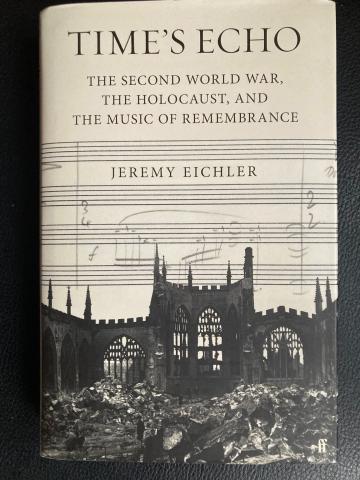
If you pick up this book while browsing, you might wonder whether we need another book about music and the Holocaust. This is not primarily a Holocaust book, though concentration camps and Einsatzgruppe are discussed. If it is primarily anything, it is a book of music criticism, but it is more than that too. The book is hard to review because it is hard to categorize--impossible to categorize fairly. The blurb says as much and the blurb, like those hyperbolic-looking testimonials on the back cover--there are more on Dr. Eichler's website--are for once fair.
The book is also hard to evaluate, although in saying that the incandescently glowing praise from critics, musicians, and other celebrities is fair, I have already said a lot. It is a book about how to listen to music where the music's historical background is used, not, or at any rate not only, to contextualize and inform the music, so much as to show how music can be read, and sometimes best or only read as a repository of historical memory, as a memorial par excellence. As I try to describe the book, my writing turns convoluted. Perhaps other reviewers have captured the subtlety of what the author aims to achieve, which is to invite the reader to appreciate that certain pieces of music, above all by R. Strauss, Schoenberg, Britten and Shoshtakovitch, were conceived as memorials, and that this music can be heard for the memories it preserves. In this way listening as an act of musical reception is indistinguishable from listening as an act of historical reception.
This way of thinking about music raises more questions than it answers. Does it even work? Well, in the right context it does. To listen to Schoenberg A Survivor from Warsaw makes sense, and may even prove intense, if we hear it as commemorating something we have some awareness of, without direct experience. Could, or should, this Schoenberg Singspiel "work" if the listener approaches it without context? Possibly not. Is this way of listening a valuable approach to Mozart, or is it only applicable to post-romantic--modernist--music? Can it reasonably be applied to all the works of the composers whom the author treats, or only to works with a particular memorializing function?
One test case, with which, according to the book, Britten's War Requiem has been favourably compared, is the Mozart Requiem. We all know that Mozart did not survive to complete the Lacrymosa. I heard a performance where in the interests of underlining the performance's (rather than the work's) memorializing intention, the musicians fell silent after those 8 bars of the Lacrymosa which Mozart himself wrote. It was a dramatic effect, and I recollect it years later. But it is not what I want to hear most of the time. I also recall seeing Peter Grimes in the Royal Opera House, and coming out thinking "What a waste of fabulous music! If I wanted to be dragged into a depression, I would not buy expensive opera tickets, I would buy a newspaper." As is not my philistine appetite for art one which R. Strauss, and the airy, deft story-telling librettist Stefan Zweig, sought to satisfy in the Viennese public?
Even Zweig's memorializing The World of Yesterday tells his stories, including communicating much of the tragedy, as far as the extent of the catastrophe could be understood at time of writing, somehow transformed as a very good read. The book does not drag the reader down. I expect to come out of the War Requiem feeling sombre, but on the opera stage I really do not want to repeat the experience of sitting through Peter Grimes or Lady MacBeth of Mtsensk (which I also saw at the Royal Opera House) on the few occasions I make an evening out of it. Perhaps the situation is different for a professional critic. As for listening to recordings, well, it just does not work in the same way. It is not only opera which is, for me, usually wasted time on some domestic sound system. I heard War Requiem at The Proms and it was profoundly moving, so hearing it broadcast from the Proms years later was profoundly disappointing. However, perhaps when the context for a work is set in the way that Dr. Eichler sets a context for the works he discusses, recordings can work. But should not a memorial of a great catastrophe, like a night at the opera, be an occasion, else it is nothing? Dr. Eichler writes a lot about particular historical performances which were significant at the time.
The conundrum of how and how far art should give pleasure is old. With Zweig's memoirs one can almost hear him whisper, with Vergil's Trojan refugees, haec olim meminisse iuvabit ('one day it will give pleasure recollect these dreadful events'). The conundrum didived literary circles and found sharp expression in plastic arts as well as in music in Vienna, where the apotheosis of ornament and, dare one say, of pleasure offered to those who could afford it by the Wiener Werkstätte, and the opposing rejection of ornament illustrated by the utilitarian if harmonious and honest "building without eyebrows", the Looshaus on Michaelerplatz, may perhaps be compared with the repulsive poles of the modernist magnet, Schoenberg against Strauss?
If that all sounds a bit vague, it is because I am still struggling with processing the book. That is surely a compliment to the author. In proposing more problems than answers, and doing so with such raw directness, such originality, one could, and I did, read Dr Eichler's outstanding and frustrating book as itself a glowing ember from the fire of Zeitwende Vienna.
[Diese Rezension besteht nur auf Englisch.]